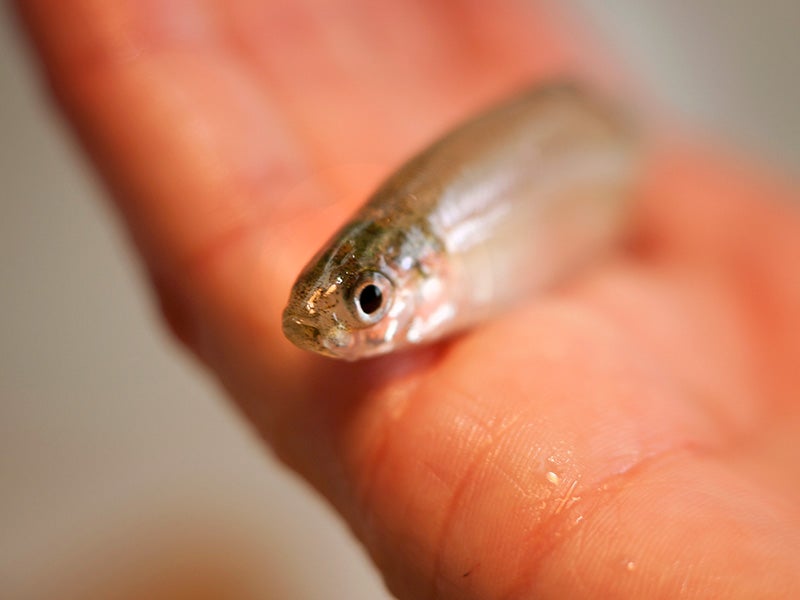Trump Official Working to Steer California’s Water to a Greedy Few
The Supreme Court upheld protections for a tiny fish, preserving an important tenet of the Endangered Species Act. Now the Trump administration wants to undo that victory.

This page was published 5 years ago. Find the latest on Earthjustice’s work.
Update, 2/13/19: In 2015, the Supreme Court denied a Big Ag attack on the tiny fish known as the delta smelt, preventing a water grab by a powerful few at the expense of a vast ecosystem in California’s Sacramento-San Joaquin Delta. Now acting Secretary of the Interior and former lobbyist David Bernhardt wants to undo that victory in a handout to his former clients.
Before joining the Trump administration, Bernhardt lobbied Congress on behalf of the Westlands Water District—a politically influential irrigation district that has long battled the federal government on behalf of big agribusinesses in California—to remove Endangered Species Act protections for the smelt. As a top-ranking Interior official, Bernhardt has asked staff to weaken those protections and free up water for industrial agriculture.
This action is an ethical misstep, and not Bernhardt’s first. Earthjustice will continue its years-long effort to defend the smelt and the fishermen, local farmers, and millions of others who depend on the Delta’s water.
Original post, 1/21/15: The delta smelt is a fish that grows to no more than three inches in length, but over the years this threatened species has made big headlines in California’s dusty, water-rights battleground. One congressional representative, Rep. Devin Nunes (R-CA), is even on record as calling the smelt a “stupid little fish” that doesn’t deserve water (see video below). Recently, the Supreme Court dismissed such narrow-minded claims by denying a Big Ag-led attack against the smelt.
Protecting the delta smelt has reverberations far beyond the fate of one little fish, however. By denying Big Ag’s challenge of water restrictions meant to protect the smelt, the Supreme Court leaves in place a longstanding ruling that the Endangered Species Act requires federal agencies to consider the preservation of all endangered species their highest priority.
But that’s not all. The Supreme Court’s decision also protects the much larger ecosystem dependent on an adequate flow of fresh water through the Sacramento-San Joaquin Delta. Thanks to protections provided to the smelt and its habitat by the Endangered Species Act, many other species are now kept from joining the smelt’s imperiled ranks.
Finally, freshwater flows through the Delta support valuable commercial and sport fisheries and provide irrigation water for Delta farmers and drinking water for millions of Californians.
You read that last part right. Making sure that tiny little fish survives is actually pretty important to ensuring that California’s taps don’t run dry.
But agricultural interests and their friends in Congress don’t agree. They often attribute the lack of irrigation water to these water restrictions to protect the smelt, but nothing could be further from the truth. California’s longstanding water management problems are rooted in massive state and federal water projects that transfer unsustainable quantities of water from the Delta to semi-arid agricultural districts in the southern Central Valley. The problem is compounded by the current historic drought and resultant light snowpack in the Sierra Nevada mountains, which used to provide the state with the majority of its water through California’s dry summers. But, it’s easier for lawmakers to deny climate change and blame the tiny delta smelt for the lack of water than to address the bigger issue of unsustainable water projects.
Now that the Supreme Court has come down solidly on the side of reason and the law, legislators should take this opportunity to rethink California’s water management policies and provide for a more realistic distribution of our limited water resources to provide for a healthy environment, safe drinking water, and sustainable agriculture. The Supreme Court’s decision will also encourage new solutions to California’s water woes, pushing legislators to move beyond a status quo dependent upon the costly transport of Delta water to arid areas unsuitable for intensive, irrigated agriculture.
Fortunately, thanks to the Supreme Court’s decision, politicians and the agricultural industry will finally be forced to move beyond blaming a tiny fish for all of their water woes. If they don’t, Earthjustice will continue its years-long effort to defend the smelt and everything that it stands for.
Check out Earthjustice’s photo essay The California Drought: Who gets the water and who’s hung out to dry?
Trent joined the California regional office in 2000 and retired in 2018. His work included successfully defending a model, open space-protection ordinance from developer challenges and twice defeating attempts by the Bush administration to gut regulations that protect our national forests.
The California Regional Office fights for the rights of all to a healthy environment regardless of where in the state they live; we fight to protect the magnificent natural spaces and wildlife found in California; and we fight to transition California to a zero-emissions future where cars, trucks, buildings, and power plants run on clean energy, not fossil fuels.
